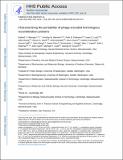Characterizing the portability of phage-encoded homologous recombination proteins
Author(s)
Filsinger, Gabriel T; Wannier, Timothy M; Pedersen, Felix B; Lutz, Isaac D; Zhang, Julie; Stork, Devon A; Debnath, Anik; Gozzi, Kevin; Kuchwara, Helene; Volf, Verena; Wang, Stan; Rios, Xavier; Gregg, Christopher J; Lajoie, Marc J; Shipman, Seth L; Aach, John; Laub, Michael T; Church, George M; ... Show more Show less
DownloadAccepted version (3.104Mb)
Publisher Policy
Publisher Policy
Article is made available in accordance with the publisher's policy and may be subject to US copyright law. Please refer to the publisher's site for terms of use.
Terms of use
Metadata
Show full item recordAbstract
© 2021, The Author(s), under exclusive licence to Springer Nature America, Inc. Efficient genome editing methods are essential for biotechnology and fundamental research. Homologous recombination (HR) is the most versatile method of genome editing, but techniques that rely on host RecA-mediated pathways are inefficient and laborious. Phage-encoded single-stranded DNA annealing proteins (SSAPs) improve HR 1,000-fold above endogenous levels. However, they are not broadly functional. Using Escherichia coli, Lactococcus lactis, Mycobacterium smegmatis, Lactobacillus rhamnosus and Caulobacter crescentus, we investigated the limited portability of SSAPs. We find that these proteins specifically recognize the C-terminal tail of the host’s single-stranded DNA-binding protein (SSB) and are portable between species only if compatibility with this host domain is maintained. Furthermore, we find that co-expressing SSAPs with SSBs can significantly improve genome editing efficiency, in some species enabling SSAP functionality even without host compatibility. Finally, we find that high-efficiency HR far surpasses the mutational capacity of commonly used random mutagenesis methods, generating exceptional phenotypes that are inaccessible through sequential nucleotide conversions. [Figure not available: see fulltext.]
Date issued
2021Department
Massachusetts Institute of Technology. Department of Biology; Massachusetts Institute of Technology. Department of MathematicsJournal
Nature Chemical Biology
Publisher
Springer Science and Business Media LLC